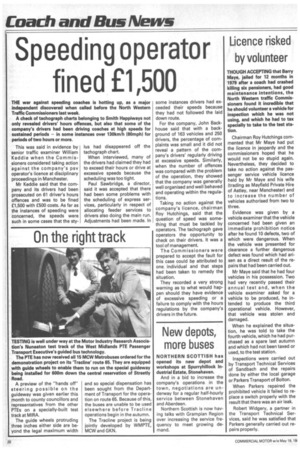Speeding operator fined £1,500
Page 22

If you've noticed an error in this article please click here to report it so we can fix it.
THE war against speeding coaches is hotting up, as a major independent discovered when called before the North Western Traffic Commissioners last week.
A check of tachograph charts belonging to Smith Happiways not only revealed drivers' hours offences, but also that some of the company's drivers had been driving coaches at high speeds for sustained periods — in some instances over 130km/h (80mph) for periods of two hours or more.
This was said in evidence by senior traffic examiner William Keddie when the Commissioners considered taking action against the company's psv operator's licence at disciplinary proceedings in Manchester.
Mr Keddie said that the company and its drivers had been prosecuted on 61 driver's hours offences and was to be fined £1,500 with £500 costs. As far as the instances of speeding were concerned, the speeds were such in some cases that the sty lus had disappeared off the tachograph chart.
When interviewed, many of the drivers had claimed they had to exceed their hours or drive at excessive speeds because the scheduling was too tight.
Paul Sawbridge, a director, said it was accepted that there had been some problems with the scheduling of express services, particularly in respect of allocating feeder services to drivers also doing the main run. Adjustments had been made. In some instances drivers had exceeded their speeds because they had not followed the laid down route.
For the company, John Backhouse said that with a background of 163 vehicles and 250 drivers, the percentage of complaints was small and it did not reveal a pattern of the company's drivers' regularly driving at excessive speeds. Similarly, when the number of offences was compared with the problem of the operation, they showed that the company was generally well organised and well behaved and operating within the regulations.
Taking no action against the company's licence, chairman Roy Hutchings, said that the question of speed was something that must be tackled by operators. The tachograph gave operators the opportunity to check on their drivers. It was a tool of management.
The Commissioners were prepared to accept the fault for this case could be attributed to one individual and that steps had been taken to remedy the situation.
They recorded a very strong warning as to what would happen should they have evidence of excessive speeding or a failure to comply with the hours regulations by the company's drivers in the future.
























































































































